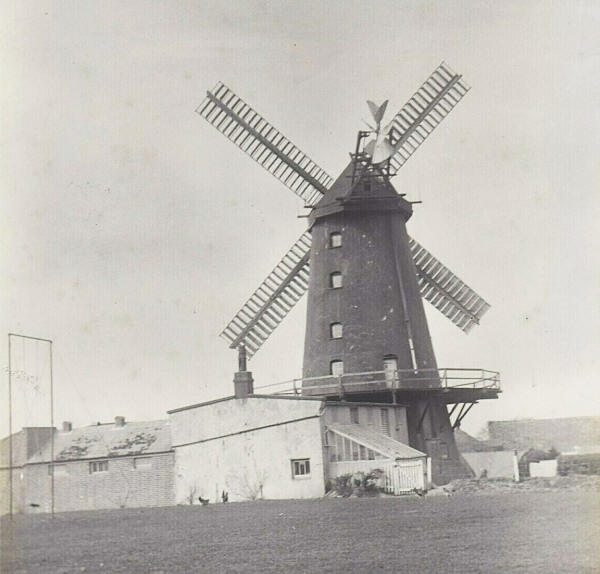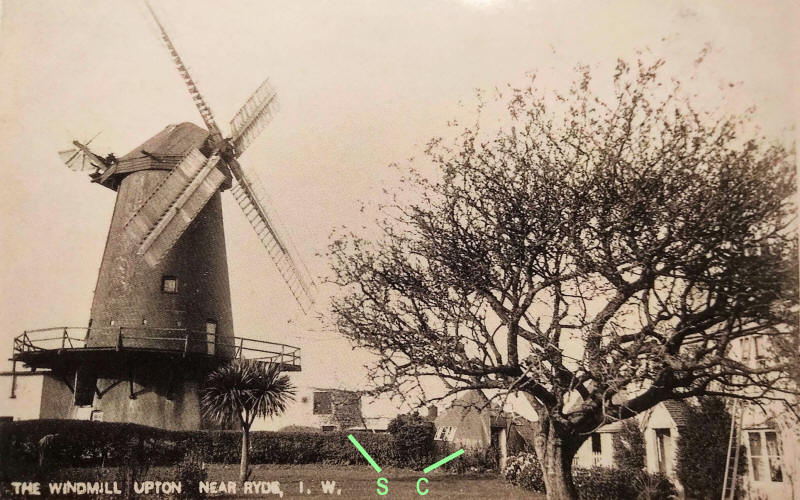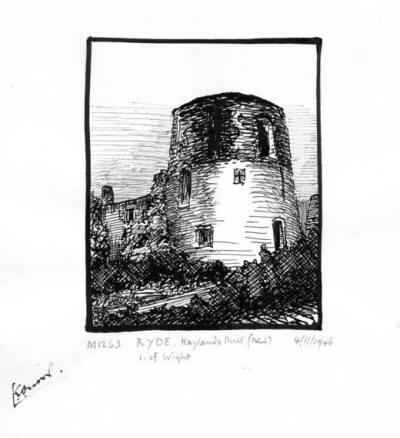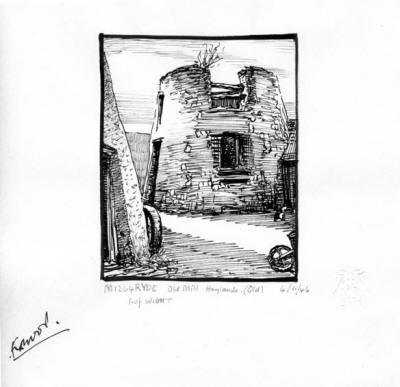|
At Upton,
Isle of Wight, the remains of two windmills stood in
close proximity into recent years. Upton Mill is
the name used on maps and cards of the time, though
the site is in Haylands on the Upton Road near
Aldermoor and Ryde. The mills are known by any of
these names! Unfortunately they were rather
neglected by windmill enthusiasts and books alike,
probably due to them not being easy to reach from
the mainland.
This
photograph of a powerful looking tower mill and
associated buildings recently appeared as an
unidentified windmill on eBay, and was bought to my
attention when it was then posted on the Windmill
Hoppers facebook site. Gareth Hughes identified
it as New Mill, Upton. There are a few views of the
mill, but none of them have been taken from this
spot, showing all the associated buildings and the
rear of the cap in detail.
|
|
The mill had
6 floors and a rather complicated hipped multi-sided
cap. Elements of its design could be seen on some
other now demolished Isle of Wight mills as well as
at Bembridge. The cap has supporting timbers for a
stage, and wooden boards would be laid on these when
maintenance of the cap was necessary. |

|
|
At the rear,
what looks like a pipe running down the tower must
be a wooden chain guide attached to the cap. This
is a common feature on a number of mills in the east
of the country, particularly Norfolk, and is to
steady the striking chain with weight attached that
operates the patent sails.
|
|

|
|
The stage is
a wide one, giving easy access to the sails.
Visible in the postcard 'front' view on the next
page, just below door height at stage level, are
what look like 3 equidistant holes, which I think
are the sawn off timbers to which the endless chain
that turned the cap into the wind could be attached
to stop it swinging about. Once hand-winding was
replaced by the fantail they became redundant.
These were a feature very common on Anglesey
windmills and would encircle the tower.
The postcard
actually shows the other mill too, known as Old
Mill. It appears as a whitewashed two storey stump
(marked S above) just to the right of the New Mill.
To the right of that in the garden near the house
can be seen the cap (marked C) of the old mill being
used as a store or summerhouse.
The Old Mill
appears to have been built in 1804 and seems to have
ceased work around 1851. It was cut down to a
2-storey stump in about 1861. Rather a short life
for a mill, but perhaps a larger more powerful one
was needed.
|
|
The dates
for the building of the New Mill vary, one source
quoting the early 19th century and another quoting
the earliest reference to it as 1854. It is
unlikely that both mills would have worked at the
same time due to their very close proximity. This
may also be the reason why the tower of the Old Mill
was truncated, as its presence would have interfered
with the wind flow to the New Mill. The New Mill
had 3 pairs of stones and worked until at least 1895
and then became derelict. One of the sails was
blown off in 1909 and it was reduced to a three
storey stump in 1911 and then used for storage.
|
 |
|
It was used
as a lookout post by the Home Guard during the war
and the last record we have of it is a Karl Wood
painting from1946 (above). It is said to have been
demolished sometime between 1953 and 1963.
|
|

|
The Old Mill
stump outlasted that of the New Mill and was also
painted by Karl Wood in 1946 (left), the only mill
enthusiast to capture it! By that time it was an
empty shell with some broken walling at the top.
The latest information suggests it was demolished
following damage in the 1987 storm.
The site of
the mills is now used as a farm supplies business.
|
|
Karl Wood
paintings by courtesy of The Mills Archive.
Information
from Windmills of Hants & the IOW (2016), Mills of
the Isles (2019), Nick Kelly, other photos and
paintings. |
